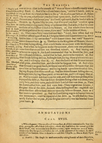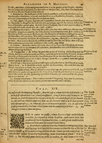He answereth the tempting Pharisees, that the case of a man with his wife shall be (as in the first institution it was) utterly indissoluble, though for one cause he may be divorced. (10) And thereupon to his Disciples he highly commendeth single life for Heaven. (13) He will have children come unto him. (16) He showeth what is to be done to enter into life everlasting; (20) what also, for a rich man to be perfect; (27) As also what passing reward they shall have which follow that his counsel of perfection: (29) yea though it be but in some one piece.<`/p>
AND it came to pass, when Jesus had ended these words, he departed from Galilee, and came into the coasts of Jewry beyond Jordan, 2and great multitudes followed him; and he cured them there.
3And there came to him the Pharisees tempting him, and saying: Is it lawful for a man to dismiss his wife for every cause? 4Who answering, said to them: Have ye not read, that he which did ‘make’ from the beginning, made them male and female? And he said: 5For this cause, man shall leave father and mother, and shall cleave to his wife, and they two shall be in one flesh. 6Therefore now they are not two, but one flesh. That therefore which God hath joined together, let • not man separate. 7They say to him: why then * did Moyses command to give a bill of divorce, and to dismiss her? 8He saith to them: Because Moyses for the hardness of your heart permitted you to dismiss your wives: but from the beginning it was not so. 9And I say to you, that * whosoever shall dismiss his wife, • but for fornication, and shall marry another, does commit advoutry: and he that shall marry her that is dismissed, committeth advoutry. 10His Disciples say unto him: If the case of a man with his wife be so, it is not expedient to marry. 11Who said to them, • Not all [a] take this word, but they to whom it is given. 12For there are Eunuchs which were born so from their mother’s womb: and there are Eunuchs which were made by men: and there are Eunuchs, which have • gelded themselves for the Kingdom of Heaven. • He that can take, let him take.
13Then * were little children presented to him, that he should • impose hands upon them and pray. And the Disciples rebuked them. 14But Jesus said to them: Suffer the little children, and stay them not from coming unto me: for the Kingdom of Heaven is for such. 15And when he had imposed hands upon them, he departed from thence.
16And * behold one came and said to him: Good Master, what good shall I do that I may have life everlasting? 17Who said to him: what askest thou me of good? One is good, God. But [b] if thou wilt enter into life keep the commandments. 18He saith to him, which? And Jesus said: Thou shalt not murder, Thou shalt not commit advoutry, Thou shalt not steal, Thou shalt not bear false witness, 19Honour thy father and thy mother, * Thou shalt love thy neighbour as thyself. 20The young-man saith to him: All these have I kept from my youth; what is yet wanting unto me? 21Jesus said to him: • If thou wilt be perfect, go, sell the things that thou hast, and give to the poor, and you shall have treasure in Heaven: and come, • follow me. 22And when the young-man had heard this word, he went away sad: for he had many possessions. 23And Jesus said to his Disciples: Amen I say to you, that a rich man shall hardly enter into the Kingdom of Heaven. 24And again I say to you, it is easier for a camel to pass through the eye of a needle, [c] than for a rich man to enter into the Kingdom of Heaven. 25And when they had heard this, the Disciples marvelled very much, saying: who then can be saved? 26And Jesus beholding, said to them: With men this is impossible: but with God • all things are possible. 27Then Peter answering, said to him: Behold we have • left all things, and have followed thee: • what therefore shall we have? 28And Jesus said to them: Amen I say to you, that you which have followed me, in the regeneration, when the Son of man shall sit in the seat of his majesty, you • also shall sit upon twelve seats, judging the twelve Tribes of Israel. 29And every one that hath left house, or brethren, or sisters, or Father, or mother, or [d] wife, or children, or lands for my name’s sake: shall receive a hundred-fold, and shall possess life everlasting. 30And * many shall be first, that are last; and last, that are first.
Footnotes
- ↑ χωρουσι capiunt.
- ↑ I see not (saith St. Augustine) why Christ should say, If thou wilt have life everlasting, keep the commandments, if without observing of them, by only faith one might be saved. Aug. de Fid. & op. ch. 15.
- ↑ St. Mark expoundeth it thus, rich men trusting in their riches, 10:24.
- ↑ Hereof is gathered that the Apostles among other things, left their wives also to follow Christ. Jerom lib. 1 adv. Jovin.
ANNOTATIONS. CHAP. XIX.
↑ 6. Not man separate.) This inseparability betwixt man and wife riseth of that, that wedlock is a Sacrament. Aug. lib. 2 de pec. origine ch. 34 to 7. De nupt. and concupis. lib. 1 ch. 10.
↑ 9. But for fornication.) For advoutry one may dismiss another, Mat. 5. But neither party can marry again for any cause during life. Aug. lib. 11 de adult. conjug. ch. 21, 22, 24. For the which unlawful act of marrying again, Fabiola that noble matron of Rome albeit she was the Innocent part, did public penance, as St. Jerom writeth in her high commendation therefore. And in St. Paul Rom. 7, it is plain that she which is with another man, her husband yet living, shall be called an advouteress: contrary to the doctrine of our Adversaries.
↑ 11. Not all take.) Whosoever have not this gift given them, it either for that they will not have it, or for that they fulfil not that which they will; and they that have this gift or attain to this word, have it of God and their own free will, Aug. lib. de grat. and lib. arbit. ch. 4. So that it is evident no man is excluded from this gift, but (as Origen here saith) it is given to all that ask for it; contrary to our Adversaries that say it is impossible, and that for excuse of breaking their vows, wickedly say, they have not the gift.
↑ 12. Gelded themselves.) They geld themselves for the Kingdom of Heaven which vow chastity, Aug. de virginitate ch. 24. Which proveth those kind of vows to be both lawful, and also more meritorious, and more sure to obtain life everlasting, than the state of wedlock, contrary to our Adversaries, in all respects.
↑ 12. He that can.) It is not said of the Precepts, keep them who can, for they be necessary under pain of damnation to be kept; but of Counsels only (as of virginity, abstaining from flesh and wine, and of giving all a man’s goods away to the poor) it is said: He that can attain to it, let him do it; which is counsel only, not a commandment. Contrary to our Adversaries that say there are no Counsels, but only precepts.
↑ 13. Impose.) They knew the valour of Christ’s blessing, and therefore brought their children to him; as good Christian people have at all times brought their children to Bishops to have their blessing. See Annotation before Chap. 10:12. And of Religious men’s blessing see Russin, lib. 2 ch. 8. hist., St. Jerom, in Epitaph. Paulae ch. 7, and in vit. Hilarionis, Theodoret, in historia Sanctorum Patrum num. 8.
↑ 21. If thou wilt be perfect.) Lo, he maketh a plain difference between keeping the commandments, which is necessary for every man: and being perfect, which he counseleth only to them that will. And this is the state of great perfection which Religious men do profess, according to Christ’s counsel here, leaving all things and following him.
↑ 21. Follow me.) Thus to follow Christ is to be without wife and care of children, to lack propriety, and to live in common, and this hath great reward in Heaven above other states of life: which St. Augustine saith, the Apostles followed, and himself, and that he exhorted others to it as much as lay in him, Aug. ep. 89 in fine, and in ps. 103 Conc. 3 post med.
↑ 26. All things possible.) This of the camel through a needle’s eye, being possible to God, although he neither hath done it, nor by like will do it: maketh against the blasphemous infidelity of our Adversaries that say, God can do no more than he hath done, or will do. We see also that God can bring a camel through a needle’s eye, and therefore his body through a door, and out of the sepulchre shut, and out of his mother a virgin, and generally above nature do with his body as he list.
↑ 27. Left all.) This perfection of leaving all things the Apostles vowed, Aug. lib. 17 de Civit Dei ch. 4.
↑ 27. What shall we have.) They leave all things in respect of reward, and Christ doeth well allow it in them by his answer.
↑ 28. You also shall sit.) Note that not only Christ, who is the principal and proper Judge of the living and the dead, but with him the Apostles and all perfect Saints shall judge; and yet that doeth nothing derogate to his prerogative, by whom and under whom they hold this and all other dignities in this life and the next.
Margin Notes
- intro. The fourth part of this Ghospel, Christ’s coming into Jewry toward his Passion.
- 3–12. The Ghospel for Marriage. And upon St. Agatha’s day, Feb. 5.
- 28–29. The 4th Ghospel upon the Conversion of St. Paul, Jan. 25. Also within the Octave, and in a votive Mass of Sts. Peter and Paul. And for holy Abbots.
- annot. 9. Marriage after divorce unlawful.
- annot. 12. Vow of chastity.
- annot. 12. Counsels not Precepts.
- annot. 13. Bishops and Religious men’s blessing.
- annot. 21. The Religious state of perfection.
- annot. 27. Vow of poverty in respect of reward.
Margin References
- 1. Mar. 10, 1.
- 4. ‘make man’
- 4. Gen. 1, 7.
- 5. Gen. 2, 24.
- 7. Deut. 14, 1.
- 9. Mat. 5, 32. Mar. 10, 11. Luc. 16, 18. 1. Cor. 7, 11.
- 13. Mar. 10, 13. Luc. 18, 15.
- 16. Mar. 10, 17. Luc. 18, 18.
- 18. Exo. 20, 13.
- 19. Lev. 19, 18.
- 30. Mar. 10, 31. Luc. 13, 30.
- annot. 9. In Epitaph. Fabiola.
- annot. 11.Origen. tract. 7 in Mat.
- annot. 12. Aug. ser. 6 de temp.
- annot. 28. Aug in ps. 121.



